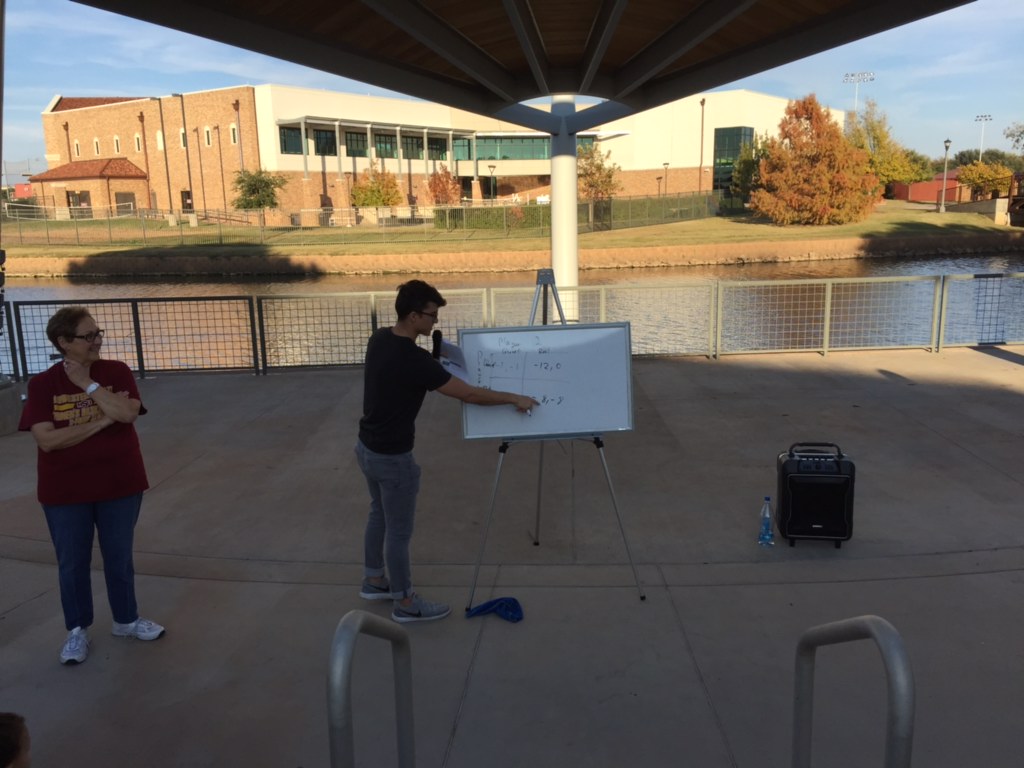
To educate the community on the science of physics, the physics department showcased a semester’s worth of research at the Science Café on Nov. 17.
“It was just started this semester,” Michael Olaya, mechanical engineering and physics senior, said. “It’s really a way for the community and the scientist on campus to connect and to explore and share ideas and kind of get a conversation going about science and how awesome it is.”
With an entire semester’s worth of research presented in one event, the physics department put its focus on a presentation that every age group could understand.
“We’ve been doing the research all semester so three or four months now,” Nick Utley, physics senior, said. “Really just the last few days we’ve been trying to convert the research that we’ve been doing into layman’s terms and to 15-minute presentations into a declaration of what we’ve achieved so far and what we hope to achieve in the future.”
Utley was surprised of the turn out the Science Café received at the Priddy Pavilion.
“[It was] better than I thought, we had a good 30 to 35 people show up,” Utley said. “Which is more than we kind of thought were gonna show up at 4 p.m. on a Friday.”
The limited amount of physics majors has caused the students to seek more opportunities to get their voice out there.
“It’s part of one of our many attempts to outreach to the community because physics tends to be a very introverted study,” Utley said. “There is really only like three or four physics majors at the university, so any chance that we get to invite other members of the other science colleges on campus to kind of show them what research we’re doing and why. As much interest as we can spark into the field that we’re majoring in, the better.”
Christelle Billan, physics junior, enjoyed her experience attending the Science Café in support of her fellow peers and hearing their different views.
“It benefited me in the sense that I was able to explore other ideas in the realms of physics,” Billan said. “Also being able to talk to people who are also interested in sorts of various research opportunities like this. It’s really interesting to see what other physics majors are doing, and also to support the physics department here. We have a very small department so we try to be as active as we can with the department, because it’s so small.”
With an event targeted towards the entire community, Utley said there was some difficulty in preparing the presentation for a diverse audience of adults and children.
“It’s hard to target a certain age demographic with upper level physics and of course it’s all communicated through mathematical languages,” Utley said. “So it’s hard to kind of put that all into layman’s terms for people who are bringing their kids up here. [It’s] something we could have done a little bit better job.”
Olaya believes science is not something that should hold people back due to their age and there is a way to reach anyone who is interested.
“Science is not ageist,” Olaya said. “Anyone can understand these things if it’s explained in the proper way. There’s a physicist [named] Richard Feynman that said, ‘you don’t fully understand something unless you can explain it to a 5-year-old.’ Opportunities to talk to young kids is really valuable as far as actually understanding what you’re talking about.”
The physics department members plan to hold more events like Science Café starting next semester. Olaya said he hopes the term “café” lightens the setting for future attendees who are anxious about attending future events.
“It’s ‘café’ because coffee shops are where people connect and communicate,” Olaya said. “Just how I talked about in emergent properties, when you put humans together in a room or in a setting and you have them exchange ideas, you get really awesome emergent properties from that.”
Physics Department opinions
“It would be beneficial to them to just sort of expand their way of thinking and just be open to an infinite amount of possibilities,” Billan said.
“We can do anything, like we said we went from astronomy to biology and we’re all in the same major,” Utley said. “You can apply it to absolutely anything in the world.”














